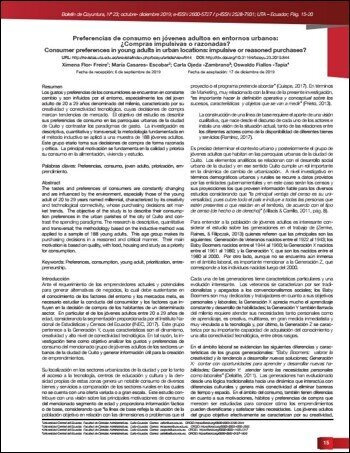Consumer preferences in young adults in urban locations: impulsive or reasoned purchases?
Main Article Content
Abstract
The tastes and preferences of consumers are constantly changing and are influenced by the environment, especially those of the young adult of 20 to 29 years named millennial, characterized by its creativity and technological connectivity, whose purchasing decisions set market trends. The objective of the study is to describe their consumption preferences in the urban parishes of the city of Quito and contrast the spending paradigms. The research is descriptive, quantitative and transversal; the methodology based on the inductive method was applied to a sample of 188 young adults. This age group makes its purchasing decisions in a reasoned and critical manner. Their main motivation is based on quality, with food, housing and study as a priority for consumption.
DOI: https://doi.org/10.31164/bcoyu.23.2019.844
URL: http://revistas.uta.edu.ec/erevista/index.php/bcoyu/article/view/844
Downloads
Article Details

This work is licensed under a Creative Commons Attribution-NonCommercial 4.0 International License.
![]()
The publications of the Boletín de Coyuntura are licensed under a Creative Commons Attribution-NonCommercial 4.0 International License (CC BY-NC 4.0). The Universidad Técnica de Ambato retains the copyright of the published works, and favors and allows the reuse of these, as long as: the authorship and original source of publication is cited, and they are not used for commercial or onerous purposes. The intellectual property of the published articles belongs to the authors.
References
Chirinos, C. (2011). Nicho de mercado: El enfoque desde el océano azul. Revista de Ingeniería Industrial(29). Recuperado el 18 de junio de 2017
Deloitte. (2011). Diferencias generacionales. Comprometiendo a todas las generaciones en el entorno laboral. Recuperado el 11 de junio de 2017, de https://www.deloitte.com.mx/documents/BoletinFactorChina/mx(es-mx)Diferencias_generacionales_MX.pdf
Duarte, T., & Ruiz, M. (2009). Emprendimiento una opción para el desarrollo. Revista Scientia et Technica, 3(43), 327.
Gil Suarez, A. (2004). Psicología económica y del comportamiento del consumidor. Barcelona: UDC.
González, P., Cañizares, C., & Patiño, G. (2018). Las redes sociales como factor de decisión: millennials frente a la generación X. Recuperado el 30 de enero de 2018, de Revista Economía y Política de la Universidad de Cuenca: https://publicaciones.ucuenca.edu.ec/ojs/index.php/REP/article/view/1629
INEC. (2017). Ecuador en cifras. Recuperado el 3 de abril de 2017, de www.ecuadorencifras.gob.ec
Lucena, A. (2009). Consumo responsable. Madrid: Talasa ediciones S. L.
Mansilla, H. (2012). Nuevos Consumos Culturales. Buenos Aires: Eduvim.
Marulanda, F., & Morales, S. (2016). Entorno y motivaciones para emprender. Revista de la Escuela de Administración de Negocios, 14.
Peñalosa, M., & López, D. (2016). La generación de los millennials frente al consumo socialmente responsable. Recuperado el 16 de abril de 2017, de Revista Cuadernos Latinoamericanos de Administración de la Universidad El Bosque: https://www.redalyc.org/pdf/4096/409650120008.pdf
Pindyck, R., & Rubinfeld, D. (2013). Microeconomía. Madrid: Pearson.
Prieto, J. (2013). Investigación de mercados (Segunda ed.). Bogotá, Colombia: Ecoe.
Quintero, J. (2011). Teorías y paradigmas educativos. Recuperado el 23 de mayo de 2017, de http://paradigmaseducativosuft.blogspot.com/search?q=maslow
Quispe, E. (2017). Guía metodológica implementación de línea base CRECER a nivel distrital. Recuperado el 21 de abril de 2017, de Presidencia del Consejo de Ministros del Perú: http://api.ning.com/files/Cg3sPiGLnvJX59HGGd3mDObuhkfcfU5I69R8ZLDnrLnEH8QhDiAugcDZjOT5FkRrL4eEHhDzVM0T7LAVVl4z8Oi9eRVg4-RP/GUIALINEADEBASE.pdf
Ramírez, E. (2017). Manual para elaboración línea base en proyectos FOS. Recuperado el 12 de mayo de 2017, de http://www.rimisp.org/wp-content/uploads/2013/11/0241-000879-manualfinal.pdf
Rodríguez, B., & Vega, H. (2016). Diferencias generacionales en prácticas de consumo. El caso de los millennials y de la generación Z. Recuperado el 1 de agosto de 2017, de Revista Jóvenes en la ciencia de la Universidad de Guanajuato: http://148.214.90.90/index.php/jovenesenlaciencia/article/view/1113
Velásquez, A. (junio de 2017). Millennials, una generación multitarea que toma decisiones inmediatas. Perspectivas de investigación(35), 10.
Villacís, B., & Carrillo, D. (2011). Estadística demográfica en el Ecuador: Diagnóstico y propuestas. Recuperado el 29 de abril de 2017, de http://www.ecuadorencifras.gob.ec/wp-content/descargas/Libros/Demografia/documentofinal1.pdf
Zemke, R., Raines, C., & Filipczak, B. (2013). Generations at Work: Managing the Clash of Boomers, Gen Xers, and Gen Yers in the Workplace (Segunda ed.). Nueva York: AMACOM.


